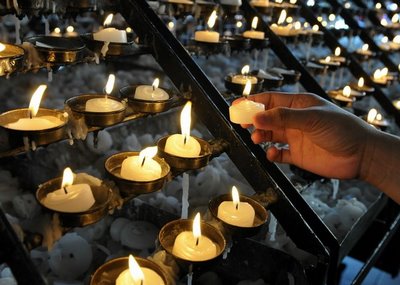It was a moment worthy of Flannery O’Connor: fashion, fame, protocol, and a reality show-entertainment media gold mine were interrupted by a Black preacher raising his voice to talk about the fire of God’s love. In O’Connor’s hands, of course, it would have ended with something like a crucifix falling from the wall and crushing a magnificent concoction of haberdashery, possibly with its fashionable and thrice-divorced wearer still in it. O’Connor remains the master of fiction in which an encounter with grace brings pride crashing down around our ears.
Flannery O’Connor wasn’t there, and if anything like that did happen, the cameras didn’t catch it, although they did catch some of the congregation appearing startled, and even Cosmopolitan called the words “moving”. What exactly happened in that wedding sermon, delivered Saturday by Michael Curry, the presiding bishop of the American Episcopal Church?
For those who missed it, here are the highlights. Bishop Curry followed a sound homiletic principle: start where people are and bring them to where you want them to be. He warmed up by talking about being in love, identifying the rightness of that feeling with its source in God. Then he drew his congregation along a path renewing their faith in the power of love, coming as it does from God, to change the world.
When love is the way, then no child will go to bed hungry in this world ever again.
When love is the way, we will let justice roll down like a mighty stream and righteousness like an ever-flowing brook.
When love is the way, poverty will become history. When love is the way, the earth will be a sanctuary.
When love is the way, we will lay down our swords and shields, down by the riverside, to study war no more.
When love is the way, there’s plenty good room – plenty good room – for all of God’s children.
“Because when love is the way, we actually treat each other, well… like we are actually family.
When love is the way, we know that God is the source of us all, and we are brothers and sisters, children of God.
My brothers and sisters, that’s a new heaven, a new earth, a new world, a new human family.
It’s a theme that might have been drawn from Caritas in Veritate or the newly-released “Considerations for an ethical discernment regarding some aspects of the present economic-financial system”: love is not peripheral or unrealistic; it is central to the good ordering of human life, in all its dimensions.
But the subtext spoke even louder than his strong voice: An African-American preached God’s word in the still-unshaken remnant of a colonial empire, to a congregation not notable for their marital fidelity or their evangelical warmth, and he spoke with tenderness and passion and hope. He didn’t flatter or pander. He didn’t cajole or castigate. He didn’t talk about them at all. He talked about the power of God’s love to renew a tired old world. He spoke of the wisdom of slaves who knew the healing balm of Gilead to a congregation whose suffering is more often related to excessive wealth and fame, not to oppression.
And it shook people, which was not what anyone expected of a sermon at a royal wedding.
Curry said in an interview afterwards that he simply spoke “the good news of Jesus Christ, that it really is good news, actually. And the good news not only that we are loved, but that this love is not just simply a sentimental thing. This is actually a way of life. And it’s a way of life that actually makes a difference in people’s lives and in the life of the world. It’s real and it’s wonderful and it’s meant for us all.”
What is important for Christian theology in this little media frenzy? First, there is an excited little buzz around the evidence that a present-day audience can be drawn into the beauty of the gospel, even in post-Christian cultures, by a clear proclamation of good news. For Christians who’ve felt that the energy of the world had moved on from their message, that’s thrilling. The Archbishop of Canterbury, Justin Weldon, has been widely quoted as saying, “Well it really was, to be honest, the good news of Jesus Christ…This was raw God, and that’s the business.”
Not surprisingly, Anglicans who’ve been lamenting the decline of their membership and energy were quick to claim Curry as one of their own. Scholar and journalist Tara Isabella Burton reviewed the sermon as “a fierce, inspiring example of the Anglican tradition at its best,” and a message that “could not be more at odds with the studied neutrality of the Royal Family.”
“As mainline, historically progressive Protestant traditions hemorrhage members worldwide, ceding Christian media visibility to the evangelical and Catholic right, Curry just made Episcopalianism go viral.
You might say Curry just made the Anglican communion great again.”
Archbishop Weldon, while acknowledging that it was not a typical royal wedding sermon, laid claim in that post-wedding interview to Curry’s sermon as characteristic, rather than exceptional. “There’s nothing conventional about Christianity,” he explained. I want to agree: looking at scripture, history, the lives of the saints, of course Weldon has a point. But the splash this sermon made clearly indicates that most people still see Christianity, perhaps Anglicanism especially, as precisely conventional, and not without reason.
Second, then, this sermon is important because other clergy will be challenged to up their homiletic game. Royal weddings set trends, and while we may see more brides opting for elegantly simple gowns imitating the Duchess of Sussex’s choice, I expect we may also see couples looking for something more of the homilies spoken at their services.
That is surely a good thing. But I have to point out, just to name the elephant in the room, that Bishop Curry is an African-American. He was preaching in the tradition of the Black church. White preachers who try to imitate that style, working up their courage to let out a shout now and then or loosening up to give a homey “brother and sister” to the congregation need to recognize that this is not just a matter of a different technique. It is a different kind of Christianity.
What many viewers perceived as refreshingly unconventional in that wedding was not simply, pace Weldon, Christian proclamation. It came from a Black preacher and a Black choir, invited by a biracial bride. Curry and the Kingdom Choir were not aiming to be “unconventional”: they were being Black Christians, voicing a tradition that practices Christianity in an emotional, physical, political, and costly way that was formed by travel down a stony path.
We have come over a way that with tears has been watered,
We have come, treading our path through the blood of the slaughtered…
So clergy interested in tapping into a wave of excitement for preaching would do well to remember what James Cone wrote back in 1970, in A Black Theology of Liberation. The answer for white theology, he argued, was to become black theology, which is to say, to reject white supremacy, identifying with and sharing in the struggle of those who are oppressed. The vitality of that tradition does not come cheap.
Last, for a moment, Christian proclamation interrupted consumerism. The royal wedding was fantastic TV: A media-fest celebrity fantasy on a Saturday morning, seasoned deliciously the fresh, authentic stories of a groom who lost his mother too young and a bride who keeps it together in the face of racism and the complications of an all-too human family. Plus a gospel choir singing a rousing “Stand By Me”! It was always going to be a terrific show.
Then that sermon happened, and the networks got a little more authenticity than they were bargaining for. It’s interesting to note that the interview with the bishops after the service, the one in which both of them spoke frankly about the proclamation of the gospel, got edited down by CNN to a clip about the evident romantic love between the couple, romance being safer for consumption than the gospel of Jesus Christ. But then again, as an SNL skit deliciously captured, even Bishop Curry’s message can be heard as playing on the consumer appeal of love.
Weekend Update Host Michael Che: Despite the crowd, your sermon got great reviews.
Kenan Thompson, as Curry: That’s cause it was all about love. Love is great. Love is redemptive. Love can change the world. And love is what makes a Subaru a Subaru.
If Martin Luther King’s words can be turned into a commercial, no doubt Bishop Curry’s sermon can be too. There will be no silver bullet, no technique or content that is guaranteed to “work,” no way to insure immunity to a culture that turns anything and everything into a lifestyle choice, because preaching is a human encounter, the word of God fragile, spoken and heard in human bodies in their times and places.
All of this is to say that speaking the word of God is no easy business. But it is work that needs renewal, and Bishop Curry has given an infusion of hope to that project. Whatever our arguments about the theology of marriage, the work of preaching in a way that moves the many who attend a wedding even though they otherwise have little contact with Christian communities ought to be a priority.
An old friend of mine, a Presbyterian minister, spoke once to me of the sense of helplessness she feels when she stands to preach, how overwhelming to see the faces of believers in their pain, confusion, despair waiting for her to speak. “All I have are my words,” she said. We’ve been reminded that those words, spoken boldly from a tradition of faithfulness, do have power to interrupt, to challenge, even to renew a tired body of Christians and a sin-sick world.




